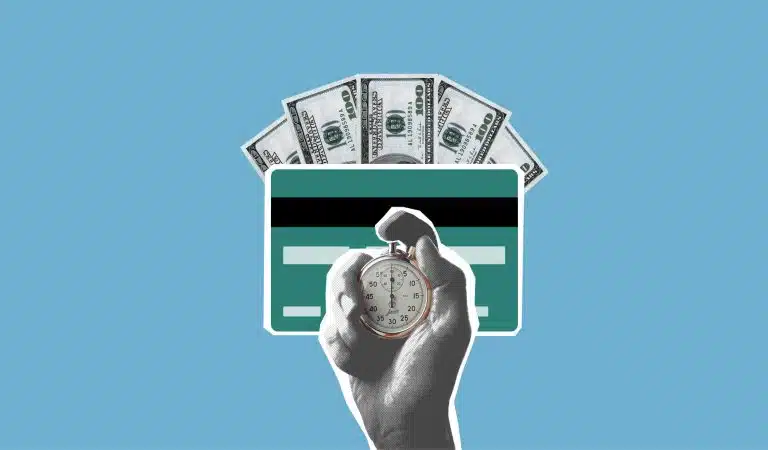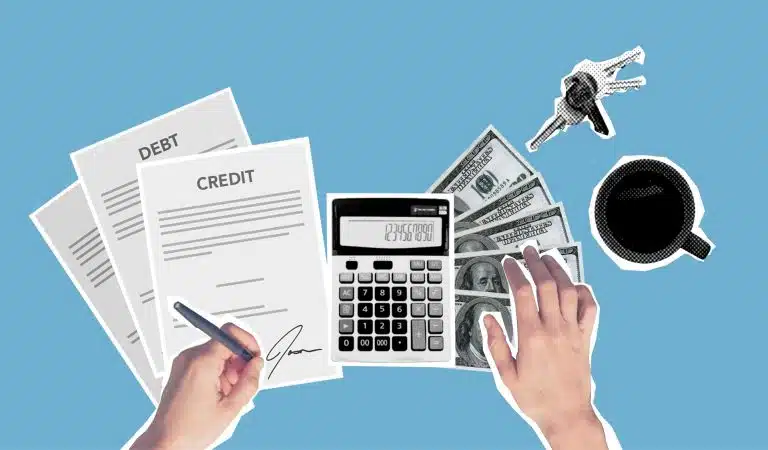Managing multiple debts can feel overwhelming for many Americans struggling under growing balances. If high interest rates and scattered due dates have you drowning in stressful monthly payments, debt consolidation may offer a lifeline out of the financial waters.
As one of the most popular debt relief options available today, debt consolidation allows burdened borrowers to simplify complicated financial obligations into one consolidated loan.
By combining credit card debt, credit card bills, medical expenses, personal loans, and any other revolving or installment accounts, debt consolidation merges multiple money owed into a single monthly payment at a potentially lower blended interest rate.
This streamlined approach promotes eased money management by replacing scattered due dates with a single repayment deadline. Fewer bills to track translates to reduced confusion and less stress over making timely transactions.
At a Glance: Traditional Debt Consolidation Loan
For those feeling maxed out making numerous creditor payments, debt consolidation provides permission to prioritize personal well-being. The organized structure consolidates mental clutter, freeing mental real estate previously occupied by finances in flux.
Lowering interest costs through refinancing high-rate balances into one aggregated account can further alleviate monetary pressure through long-term savings on accrued costs.
Does this simplified solution perfectly address all financial woes? Not alone. However, debt consolidation presents a systematic starting point for regaining command over compounded costs and easing cluttered minds.
By considering both pros and cons relative to individual circumstances, informed consumers stand empowered to strategize the smartest debt management tactics. This guide defines consolidation basics while assessing advantages and limitations to equip readers to determine if combining accounts suit personal money missions.
How Debt Consolidation Works
Understanding Debt Consolidation
Debt consolidation involves combining several debts, such as credit cards or personal loans, into a single loan or line of credit. This new loan pays off the existing debts.
A debt consolidation calculator can help users assess their potential savings by providing personalized estimates based on their financial information. Common types of debt consolidation include personal loans and balance transfers to a credit card with a lower interest rate.
The main benefit is that debt consolidation simplifies payments by replacing multiple minimum payments with a single monthly payment.
This makes managing debt easier by cutting down on late fees and freeing up time otherwise spent juggling due dates. If the consolidation route offers lower interest rates compared to existing rates, it can also potentially save money in the long term.
Common Types of Debt Consolidation Loans
Secured vs. Unsecured Loans
A secured loan, such as a home equity loan, uses collateral, typically your home, to back the loan. Home equity loans allow individuals to access a significant portion of their home equity. This provides better terms than an unsecured loan that is not backed by collateral. However, it puts your home at risk if you default.
An unsecured personal loan draws from your credit history alone. Interest rates tend to be higher, but don’t risk your property. Federal student loans can also be consolidated into a direct consolidation loan from the U.S. Department of Education.
Balance Transfers
Balance transfer credit cards allow you to pay off existing credit card balances at a 0% promotional rate, sometimes for up to 21 months. Just be sure to pay off the full transfer within the 0% period to avoid the higher post-promotional interest rate kicking in.
Pros of Debt Consolidation

Simplified Monthly Payments
Combining multiple debts into one monthly payment streamlines finances and makes it simpler to stay on top of due dates. Setting up automatic loan payments can further simplify this process and may even offer a 0.25% rate discount if done through a PNC checking account.
This consolidates stress and saves time otherwise spent tracking down individual loan statements. One check or online payment does it all.
Potentially Lower Interest Rates
Consolidating debt qualifies borrowers for potentially lower interest rates, especially those with good credit. By reducing monthly payments and overall interest costs, debt consolidation can help eliminate debt faster and achieve financial freedom more efficiently.
This is because debt consolidation refinances existing high-interest loans and credit card bills into a single new loan. Over time, the lower rate can translate to significant interest savings versus keeping high-rate balances.
Cons of Debt Consolidation
Risk of Accruing More Debt
While debt consolidation simplifies payments, it doesn’t eliminate existing debt. If discipline slips, spending habits that led to initial debt problems can resurface. Borrowers may charge up credit cards again as bills get paid off, negating progress and costing more in interest down the road.
Potential Fees and Long-Term Costs
Origination fees, balance transfer fees, and other charges apply with some debt consolidation options. Extending repayment over many years through a lengthy consolidation loan term also spreads interest costs over a longer period, potentially increasing the overall amount paid versus shorter payoff options.
Is Debt Consolidation Right for You?
Factors to Consider Before Consolidating
Thoroughly evaluate finances by reviewing credit scores, current interest rates on individual accounts, and monthly budgets. Determine whether consolidating existing debt still enables meeting long-term savings and financial goals. It may not always be the most cost-effective choice.
Alternatives to Debt Consolidation
Explore other debt management options, such as debt settlement negotiation to lower existing balances, credit counseling for budgeting assistance, or personal loans from credit unions offering competitive rates.
For certain situations, other approaches may prove more beneficial than debt consolidation alone. Financial discipline remains key no matter the strategy employed.
Common Pitfalls to Avoid with Debt Consolidation:
- Taking on more debt: Do not use debt consolidation as an excuse to rack up new credit card charges or loans. Instead, consolidate existing debt and commit to paying it off.
- Extending repayment periods too long: Stretching out payments over many years can significantly increase total interest costs due to more interest charges accumulating each month. Keep terms reasonably short if possible.
- Failing to improve spending habits: Underlying overspending behaviors that led to initial debt won’t magically change with consolidation alone. It takes self-control and budgeting discipline to maintain positive financial progress.
- Overlooking consolidation fees: Origination, transfer, and other consolidation fees can add substantial amounts to the overall cost if not accounted for upfront.
- Ignoring alternatives: Debt consolidation may only sometimes be the lowest total cost solution depending on creditworthiness and alternative options like debt settlement, credit counseling, or balance transfers. Make the comparisons.
- Letting promotional interest expire: Intro 0% APR cards require paying off transferred balances before higher ongoing rates kick in, so strictly follow timely payment schedules.
- Focusing only on payments, not principal: It’s easy to get wrapped up in lower minimums, but it’s important to consistently pay above minimums to chip away at balances faster over the long run.
- Not improving credit in tandem: Debts hurt credit scores, so working simultaneously to address derogatory marks through on-time payments and credit account management optimizes future financial opportunities.
Improve Your Credit Score While Consolidating Debt
One of the best ways to boost your credit score when consolidating debt is to ensure timely payments on all accounts. Payment history makes up 35% of a FICO score, so any late payments can seriously damage it. When consolidating, prioritize the debt consolidation payments along with all other bills. Set up automatic payments or calendars/reminders to avoid missed or late payments.
It’s also crucial to reduce your credit utilization ratio, which is the second biggest factor at 30% of your score. This measures your credit balances vs. total credit limits.
Pay down credit card balances beforehand if needed to get below 30% usage across all cards and loans. The further below 30%, the better. You can check your current utilization on each account and your overall ratio using a free credit monitoring tool.
While consolidating debt, refrain from applying for too much new credit. Multiple applications considered by lenders in a short timeframe may mark you as “credit hungry” and temporarily lower your score. Space out applications by 6 months or longer if possible, including when shopping around for the best debt consolidation loan rates.
Alongside responsible use, consider asking existing credit card issuers, auto lenders, or others to increase your credit limits over time.
This allows you to charge the same amounts but get reported with lower utilization percentages on the affected accounts. Just be sure increased access doesn’t tempt overspending since that defeats the purpose.
Consolidate Debt and Debt Payments
See if a family member or someone you trust has excellent credit. Ask to be added as an authorized user to one of their oldest card accounts that are in good standing. Their positive payment behavior could then be factored into your credit file history and mix of accounts over time. Just make sure not to accrue debt on a card you didn’t open yourself.
It’s also wise to sign up for free services like Credit Karma, Credit Sesame, or your lender/card issuer’s online accounts. These tools let you regularly monitor your changing scores, watch for signs of identity theft, and efficiently dispute errors on your credit reports within 30 days of noticing them as a consumer right. Errors hurt scores until corrected.
Above all, be patient. While disciplined money habits, debt consolidation, payment history, and other techniques gradually boost your credit profile, lenders only report information monthly. Score changes are incremental, and full credit benefits lag responsibility by around 6 months. Commit to financial literacy as a long game for optimal results.
Again, here are your go-to tips cheat sheet:
- Pay all bills on time – Make sure your debt consolidation payments and all other accounts are paid on or before the due date every month. Payment history makes up the largest portion of your credit score.
- Keep credit utilization low – Use no more than 30% of your available credit across all cards and accounts. Pay balances down beforehand if needed.
- Limit applications – Too many credit applications in a short time can negatively affect your score. Space them out by 6 months or more, if possible.
- Consider adding an authorized user – Ask someone with excellent credit to add you as an authorized user. Their good payment history may rub off on your credit history.
- Check for and dispute errors – Errors on your reports hurt your score. Regularly checking for inaccuracies gives you a chance to dispute and remove them.
- Ask for credit limit increases – Higher limits relative to your balance can positively impact utilization. Only do this if spending discipline allows.
- Pay down debt while keeping credit mix varied – Maintain a blend of installment loans, revolving accounts, and at least one mortgage or auto loan to demonstrate responsible usage.
Be patient – Credit changes incrementally over 6 months or more as positive payments are reported, so plan long-term for optimal results.
Conclusion and Insights
If done properly, debt consolidation can be an effective tool for controlling multiple debts. However, it is not a magic cure-all and ultimately requires ongoing self-discipline to succeed.
The key is maintaining responsible financial habits even after existing bills consolidate into one new loan or credit line. Without diligent money management and budgeting, old spending behaviors could easily resurface and erase hard-won progress.
It is also important to understand that debt consolidation alone may not yield the lowest overall interest costs, depending on an individual’s credit profile and options. Carefully weighing alternatives like balance transfers, debt management programs, or settlement negotiations could save more money in some cases.
It is advised to speak to a nonprofit credit counselor to analyze which approach optimally serves long-term goals given individual financial realities and strengths.
Some Insights: Couldn’t Hurt
With dedication to paying down principal each month above minimums, conscientiously managing credit spending, keeping utilization ratios low, and disputing reporting errors, debt consolidation borrowers stand the best chance at improving their credit scores over time.
Higher creditworthiness opens doors to better financing terms for future loans, from mortgage refinances to auto purchases.
Now armed with a comprehensive overview of consolidating debts and pitfalls to avoid, readers are empowered to strategize the wisest plan of attack. Remember, tackling high-interest balances in an organized, patient manner builds financial stability and confidence with each small victory. Be proud of every step taken toward achieving money mastery.
If overwhelmed individuals feel professional guidance could accelerate positive progress, consider contacting a reputable nonprofit like Lender Reviews for budgeting advice and customized recommendations.
As one of the leading comparison review sites, Lender Reviews connects consumers with top-rated lenders, many of whom offer competitive debt consolidation loans and credit counseling.
Additional Recommendations
This article discussed debt consolidation at a high level. For those interested in learning more, here are some additional resources:
- Explore other debt management options. Compare debt settlement, credit counseling, debt management plans, and personal loans from credit unions as potential alternatives to consolidation.
- Learn how to improve your credit score. A strong credit history qualifies borrowers for the most competitive consolidation rates and terms. Read about effective credit-building strategies.
- Discover the benefits of balance transfer loans. For eligible borrowers, 0% intro APR credit cards offer an interest-free window to pay down existing balances. Understand card terms to avoid fees.
- Seek professional guidance. Certified credit counselors and reputable nonprofit organizations provide impartial assessments. Their guidance considers an individual’s full financial picture.
Go With Lender Review
Carefully weighing all the pros and cons of debt consolidation empowers more informed personal finance decisions. With discipline and a customizable strategy, multiple approaches could help tackle existing balances. The right path hinges on each borrower’s unique circumstances.
Browse loan options tailored to individual needs and credit profiles on their website. A Lender Reviews analysis pinpoints potential partners committed to supportive customer service from application through repayment.
By tapping accredited experts, formerly overwhelmed clients gain an indispensable ally for conquering compound debt once and for all. Financial freedom starts here – don’t delay regaining control, so contact Lender Reviews today!









